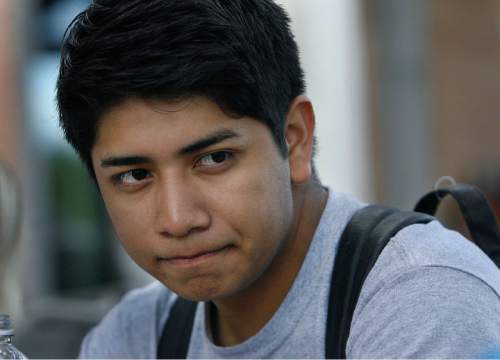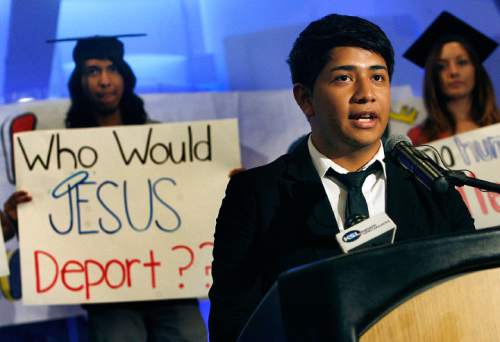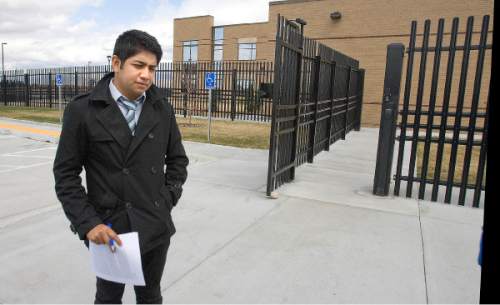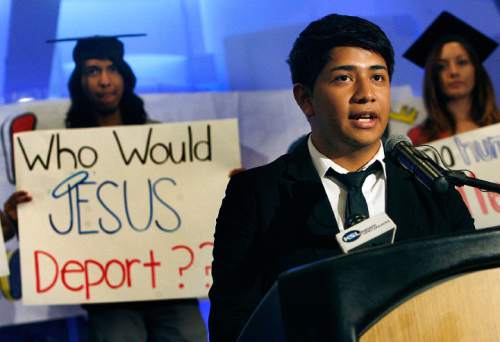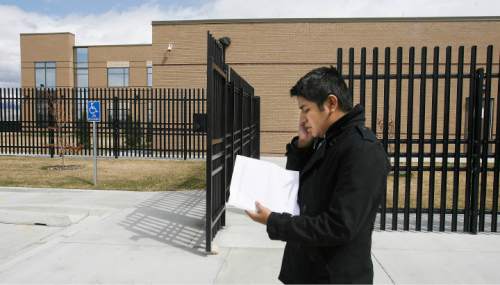This is an archived article that was published on sltrib.com in 2015, and information in the article may be outdated. It is provided only for personal research purposes and may not be reprinted.
Just as novelists often base their books on personal experiences, Deyvid Morales, 24, is using his often-in-Utah-headlines immigration battles to write free smartphone apps to help fellow undocumented immigrants.
His latest one seeks to help "dreamers" — immigrants who, like himself, were brought to the United States without papers as children by their parents — to find college scholarships.
It was inspired by a translating job he had at West Valley City's Granger High School, where he saw too many immigrants drop out "because they figure what's the point if college is not an option." But he knows college is possible because he managed to attend despite his own high-profile deportation fights.
It is his second smartphone app.
The first was designed to help undocumented immigrants who face detention and deportation. He developed it after he was pulled off a bus and detained by the Border Patrol in New Mexico — after he had received permission to remain in the country — and shouted out instructions to others about their rights.
"I can't be in every bus telling them their rights, but I could make something that would be like if I was in the bus and telling them what their rights were," Morales previously told The Salt Lake Tribune.
Now, he says, after developing his second app, "I'm not a writer. I'm not an artist. But there's a couple things that I can do, which is to organize information and make an app — and make it available for everybody. ... I'm looking for how I can help as many people as possible with what I have."
Morales' parents brought him to the U.S. from Mexico at age 9 without papers. His struggles and victories since then fuel his desire to help other undocumented immigrants.
He first landed in Utah headlines in 2011, when he had been traveling to start Bible school in Louisiana hoping to become a pastor. But immigration officials boarded his bus to seek people who were not U.S. citizens, and he was arrested.
He soon became a sort-of poster child for the plight of "dreamers," and was featured in several news conferences and news stories.
He tried to file a complaint against a U.S. Immigration and Customs Enforcement agent for allegedly violating his civil rights by telling him not to speak publicly about his case or he would have his bond revoked and would land back in jail pending his deportation hearing.
Just before he expected to be deported, President Barack Obama issued an order to defer deportation of "dreamers" like him with clean criminal records — called Deferred Action for Childhood Arrivals, or DACA.
Morales's new app is called DACA Scholars.
In 2012, after receiving official deferral from deportation, Morales was pulled off a bus and detained by immigration agents again in New Mexico — an incident that provided inspiration for his first app.
Meanwhile, Morales has been attending Salt Lake Community College. His experiences changed the focus of his studies from becoming a pastor to hopes of eventually becoming a civil-rights lawyer.
He is also working full time at the Mexican Consulate in Salt Lake City — doing such things as working with the U.S. Border Patrol to help find missing Mexican nationals. "With my history, it's a little bizarre that I'm now often working with the Border Patrol."
He had worked as a para-educator for a couple of years at Granger High, which included translating for families of troubled immigrant students. He said he was disappointed that students and parents alike "just felt like college was not an option for them because of their status," so "it didn't matter if they dropped out."
But he believes "education is essential for Latinos. It is the way to a better life."
He worked with the Seattle-based software group Subsplash, which also produced his first app. It generally focuses on developing Christian-based apps, but Morales said it saw his DACA Scholars as a good opportunity.
It lists 60 scholarships so far nationally available to DACA students, and Morales is always looking for more. It includes tips on when and how to apply for a scholarship — and pointers on writing scholarship essays.
He said the Utah System of Higher Education helped him with that and is considering making how-to videos to put on the app.
"I just want to encourage everybody to use their talents to help others," he said. "I want to empower Latinos to get an education, and encourage others to do what they can."
He adds, "I've been through a lot in the short period of time I've been alive. I'm trying to use that to help others."


